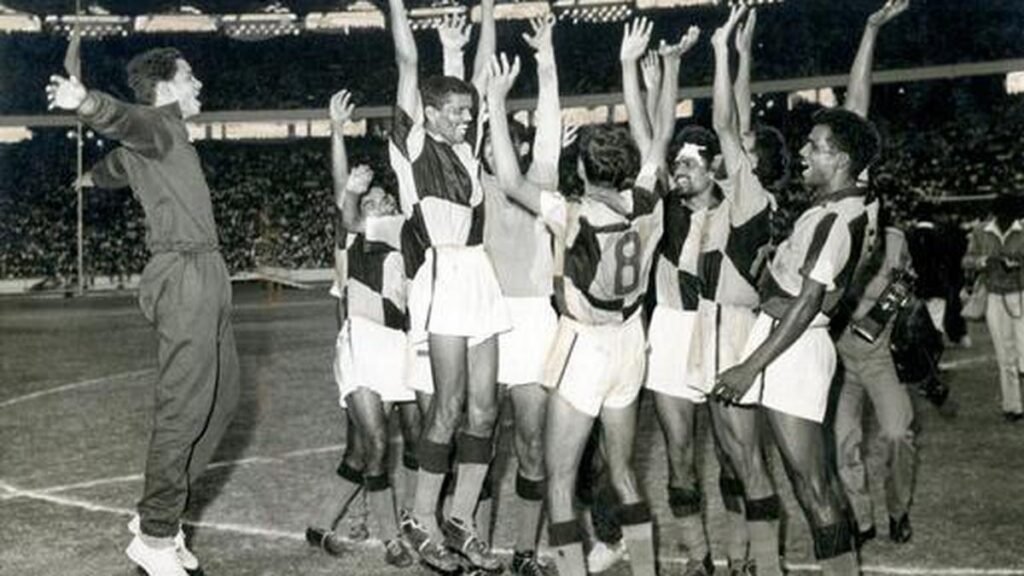जकार्ता में महाद्वीपीय कार्यक्रम का आयोजन 1962 ASIAN GAMES FOOTBALL the tournament was held in Jakarta, Indonesia, from 25 August to 4 September 1962. Matches were held at three venues: the Tebet Football Stadium, the Ikada Stadium and the main Senayan Stadium. The tournament was a significant moment in the history of Asian football, with teams from across Asia gathering in the Indonesian capital 1962 ASIAN GAMES FOOTBALL.

The Asian Games, a continental multi-sport event held every four years, showcases the best of Asian athleticism across various disciplines. The football tournament within this broader sporting spectacle provided a platform for Asian nations to display their footballing talent and compete for regional supremacy, contributing to the development and popularity of the sport across the continent.
1962 FINAL MATCH 🚀 पिछले दिन के हमले के बावजूद भारत का खेल जारी
पिछले दिन के हमले के बावजूद भारत का खेल जारी 1962 FINAL MATCH india played a pivotal role in the events leading up to the 1962 Asian Games, spearheading the movement against Indonesia’s refusal to allow athletes from Taiwan and Israel to participate. This stance ultimately resulted in Indonesia’s expulsion from the International Olympic Committee, creating tension between the two nations 1962 FINAL MATCH.
On the morning of September 3, 1962, the situation escalated dramatically when an angry mob attacked the Indian Embassy in Jakarta. This violent incident forced the majority of the Indian delegation to leave the country, highlighting the deteriorating diplomatic relations and rising anti-Indian sentiment.
Despite the attack on their embassy the previous day, the Indian team courageously took to the field for the football final on September 4. The atmosphere was charged with heightened anti-Indian sentiment, with the Indian team facing a hostile environment akin to playing against an enemy nation. This final match was played under extraordinary circumstances, showcasing the team’s determination to compete regardless of the political turmoil surrounding the event.
1962 FINAL SCORECARD 🚀 भारत ने दक्षिण कोरिया को 2-1 से हराया
भारत ने दक्षिण कोरिया को 2-1 से हराया 1962 FINAL SCORECARD the tournament ended in dramatic fashion as India won 2-1 against South Korea. The win not only won India the football championship but also earned them the final gold medal of the Asian Games, a major achievement in the face of adversity 1962 FINAL SCORECARD.
However, the victory was met with an unexpected and hostile response from the crowd. As India clinched their win, the 110,000 spectators at the Senayan Stadium erupted in a chorus of boos. This reaction starkly illustrated the tense political atmosphere surrounding the event and the heightened anti-Indian sentiment prevalent at the time, creating a surreal and challenging environment for the victorious Indian team.
1962 FINAL WINNER 🚀 भारत की जीत पर संकट का साया
भारत की जीत पर संकट का साया 1962 FINAL WINNER india won the final under the leadership of Rahim, showing great strategic strength despite the tense political atmosphere at the time. This victory was an important milestone in the history of Indian football and demonstrated the ability of the Indian team to perform at the highest level under difficult circumstances 1962 FINAL WINNER.
However, the diplomatic crisis surrounding the event cast a shadow over India’s remarkable achievement. While the victory was momentous, its significance was somewhat diminished by the political turmoil of the time. Decades later, the biographical film ‘Maidaan’ has helped to revitalize interest in this pivotal moment, bringing renewed attention to India’s football legacy and the team’s resilience in the face of adversity.
1962 INDIA COACH 🚀 रहीम का दशक भर का नेतृत्व शिखर पर
रहीम का दशक भर का नेतृत्व शिखर पर 1962 INDIA COACH Syed Abdul Rahim served as the head coach of the Indian national football team for over a decade, from 1950 to 1963. This period is considered the “Golden Era” of Indian football, with the national team securing gold medals at the Asian Games in both 1951 and 1962 under Rahim’s leadership. His tactical acumen and ability to bring out the best in his players were instrumental in India’s success on the international stage during this time 1962 INDIA COACH.
Unfortunately, Rahim passed away in the early 1960s, and Indian football experienced a decline after reaching its peak during his tenure. The national team struggled to replicate the achievements of the Rahim era, as Indian football entered a period of relative obscurity after the glory days of his leadership. Despite this, Rahim’s legacy as one of India’s greatest football coaches remains undisputed, and victory in this tournament is a testament to his immense contribution to Indian football.
The 1962 Asian Games football tournament, held in Jakarta, Indonesia, was a defining moment in the history of Indian football. India dominated the tournament with a 2-1 win over South Korea in the final. However, the victory was overshadowed by a crisis as the Indian team had to play in the final despite being attacked the day before. The team’s success can be attributed to the decade-long leadership of coach Syed Abdul Rahim, whose tenure culminated with this victory. The tournament will always be remembered as a bittersweet moment in the history of Indian football, with the team’s resilience and determination shining through adversity to ultimately win a well-deserved intercontinental trophy.















